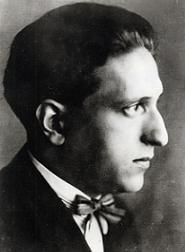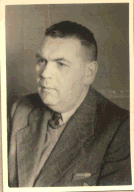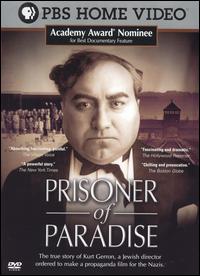
Brundibár is a children's opera by Jewish Czech composer Hans Krása with a libretto by Adolf Hoffmeister, made most famous by performances by the children of Theresienstadt concentration camp (Terezín) in occupied Czechoslovakia. The name comes from a Czech colloquialism for a bumblebee.

Kurt Gerron was a German Jewish actor and film director. He and his wife, Olga were murdered in the Holocaust.

Holocaust (1978) is an American four-part television miniseries which explores the Holocaust from the perspectives of the fictional Weiss family of Jews in Germany and that of a rising member of the SS, who gradually becomes a war criminal. Holocaust highlights numerous events which occurred up to and during World War II, such as Kristallnacht, the creation of Jewish ghettos, and later, the use of gas chambers.

Theresienstadt Ghetto was established by the SS during World War II in the fortress town of Terezín, in the Protectorate of Bohemia and Moravia. Theresienstadt served two main purposes: a waystation to the extermination camps, and a "retirement settlement" for elderly and prominent Jews to mislead their communities about the Final Solution. Its conditions were deliberately engineered to hasten the death of its prisoners, and the ghetto also served a propaganda role. Unlike other ghettos, the exploitation of forced labor was not economically significant.

Pavel Haas was a Czech composer who was murdered during the Holocaust. He was an exponent of Leoš Janáček's school of composition, and also utilized elements of folk music and jazz. Although his output was not large, he is notable particularly for his song cycles and string quartets.

Theresienstadt. Ein Dokumentarfilm aus dem jüdischen Siedlungsgebiet, unofficially Der Führer schenkt den Juden eine Stadt, was a black-and-white projected Nazi propaganda film. It was directed by the German Jewish prisoner Kurt Gerron and the Czech filmmaker Karel Pečený under close SS supervision in the Theresienstadt concentration camp, and edited by Pečený's company, Aktualita. Filmed mostly in the autumn of 1944, it was completed on 28 March 1945 and screened privately four times. After the war, the film was lost but about twenty minutes of footage was later rediscovered in various archives.

Paradise Camp is a 1986 documentary film about Theresienstadt concentration camp in Czechoslovakia, written and directed by Australians Paul Rea and Frank Heimans, respectively. Czechoslovakian Jews were first told that Theresienstadt was a community established for their safety. They quickly recognized it as a ghetto and concentration camp.
Voices of the Children is a 1999 Emmy-Award winning documentary film written and directed by Zuzana Justman. It tells the story of three people who were imprisoned as children in the Terezin concentration camp. It was produced and shown on television in the United States.
Spuren nach Theresienstadt / Tracks to Terezín is a film with Herbert Thomas Mandl, a survivor of the Holocaust.

Karl Rahm was a Sturmbannführer (major) in the German Schutzstaffel who, from February 1944 to May 1945, served as the commandant of the Theresienstadt concentration camp. Rahm was the third and final commander of the camp, succeeding Siegfried Seidl and Anton Burger. He was hanged for war crimes.
Martin Roman was a German jazz pianist.
The Ghetto Swingers were a jazz band organised in the Nazi concentration camp Theresienstadt.
Hans Günther was an SS-Sturmbannführer who was the head of the "Central Office for Jewish Emigration in Prague" during World War II. He was in charge of the deportation of Czech Jews to death camps during the Holocaust. He was killed by Czech partisans in 1945.
Roy Kift in Bideford, Devon, is an English writer.
Malcolm Clarke is an English documentary film maker. He began his career at the BBC, directing everything from the nightly news and documentaries, to game shows and music programming. He is now working for ARTeFACT Entertainment, a media company located in Shanghai, China, founded by Chinese producer Han Yi.

Benjamin Israel Murmelstein was an Austrian rabbi. He was one of 17 community rabbis in Vienna in 1938 and the only one remaining in Vienna by late 1939. An important figure and board member of the Jewish group in Vienna during the early stages of the war, he was also an "Ältester" of the Judenrat in the Theresienstadt concentration camp after 1943. He was the only "Judenältester" to survive the Holocaust and has been credited with saving the lives of thousands of Jews by assisting in their emigration, while also being accused of being a Nazi collaborator.

Night Will Fall is a 2014 documentary film directed by Andre Singer that chronicles the making of the 1945 British government documentary German Concentration Camps Factual Survey. The 1945 documentary, which showed gruesome scenes from newly liberated Nazi concentration camps, languished in British archives for nearly seven decades and was only recently completed.
Maurice Rossel was a Swiss doctor and International Committee of the Red Cross (ICRC) official during the Holocaust. He is best known for visiting Theresienstadt concentration camp on 23 June 1944; he erroneously reported that Theresienstadt was the final destination for Jewish deportees and that their lives were "almost normal". His report, which is considered "emblematic of the failure of the ICRC" during the Holocaust, undermined the credibility of the more accurate Vrba-Wetzler Report and misled the ICRC about the Final Solution. Rossel later visited Auschwitz concentration camp. In 1979, he was interviewed by Claude Lanzmann; based on this footage, the 1997 film A Visitor from the Living(fr) was produced.
During World War II, the Theresienstadt concentration camp was used by the Nazi SS as a "model ghetto" for fooling Red Cross representatives about the ongoing Holocaust and the Nazi plan to murder all Jews. The Nazified German Red Cross visited the ghetto in 1943 and filed the only accurate report on the ghetto, describing overcrowding and undernourishment. In 1944, the ghetto was "beautified" in preparation for a delegation from the International Committee of the Red Cross (ICRC) and the Danish government. The delegation visited on 23 June; ICRC delegate Maurice Rossel wrote a favorable report on the ghetto and claimed that no one was deported from Theresienstadt. In April 1945, another ICRC delegation was allowed to visit the ghetto; despite the contemporaneous liberation of other concentration camps, it continued to repeat Rossel's erroneous findings. The SS turned over the ghetto to the ICRC on 2 May, several days before the end of the war.









